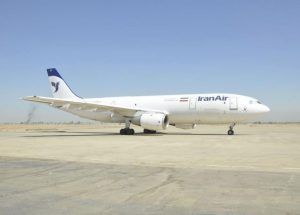By Parisa Hafezi and John Irish
Paris, Feb 8 (Reuters) – IranAir is not having problems financing plane purchases from Boeing and Airbus but deliveries could be hampered if the United States does not extend export licences, Chief Executive Farzaneh Sharafbafi said on Thursday.

She told Reuters on the sidelines of a Euromoney Iran conference in Paris that the national carrier would receive its first Boeing passenger jet later this year, after nuclear-related sanctions were lifted in 2016. IranAir expects to start receiving custom-built Airbus aircraft next year.
“The delivery of Boeing will be in 2018 and Airbus in 2019. We have no problem with the financing of the deals,” Sharafbafi said.
IranAir has agreed to buy 80 aircraft from Boeing and 100 from Airbus but only a handful have been delivered amid what bankers describe as a shortage of financing for Iran, due to the reluctance of Western banks to risk U.S penalties.
Industry sources say another key sticking point is that IranAir has been slow to pay deposits, which are needed for Boeing and Airbus to start building new jets.
Sharafbafi confirmed deposits had not been paid, without elaborating.
Industry sources have expressed doubts over whether Boeing planes will be delivered as early as 2018, due to the lead time needed to order parts for the planes involved, long-range 777s.
Former Airbus sales chief John Leahy said in January that its schedule for deliveries to Iran could slip and cited the importance of making down payments.
Boeing has yet to publish the Iran order officially, a step which the company says it can only take if it has a down payment.
So far IranAir has received three brand-new Airbus jets originally built for other airlines that could not take delivery, and eight new ATR turboprops.
It is able to purchase planes under the 2015 deal to open up trade in exchange for curbs on Iran’s nuclear activities.
Even after the accord, all exports of Western aircraft to Iran need licences from the U.S. Treasury because of the number of U.S. parts. Current licences expire at the end of 2020 and would need to be extended to complete the planned deliveries.
“Whether the licences will be renewed, we have to wait and see: it depends on the United States,” Sharafbafi said.
Under the planned delivery schedule, the initial period covered by existing licences valid until 2020 would include 37-38 Airbus jets, 15 from Boeing and all 20 ATRs, she said.
“We should utilise this timeframe under the licence,” she added.

Iran has accused the United States of dragging its feet over the steps needed to implement the nuclear deal, which it says is non-negotiable.
U.S. president Donald Trump in January warned European allies and Congress they had to work with him to fix “disastrous flaws” in the pact or face a U.S. exit.
Trump said he would not keep issuing “waivers” on sanctions against Iran unless his conditions were met.
(Reporting by Parisa Hafezi, John Irish; Editing by Catherine Evans)

